Hamish McLachlan chats with Daisy Pearce about being a leading voice of women’s sport and childhood insecurities
IT is thought by many that Daisy Pearce is the most complete female footballer. Hamish McLachlan sits down with Pearce and chats about being a leader in women’s sport and difficult family circumstances.
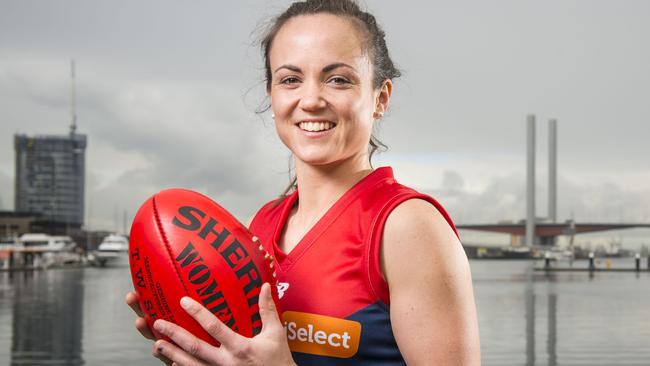
VIC News
Don't miss out on the headlines from VIC News. Followed categories will be added to My News.
IT is thought by many that Daisy Pearce is the most complete female footballer in the country. She has won the Helen Lambert Medal (Brownlow equivalent) six times.
Years ago, she was the only girl in her junior football side in Bright.
Daisy will be one of the faces of the Women’s AFL League that starts in 2017.
We spoke about childhood insecurities, difficult family circumstances, junior football, being a leading voice of women’s sport, midwifery, her inspirational mother and driving a bus on an open highway with her father.
HM: You’re a country girl, born in Bright. How many women were playing footy in your hometown when you first started training?
DP: None.
HM: You were the only one?
DP: I was the only one. It made me think I was the only girl in Australia that could play football! I have since learnt otherwise thankfully.
HM: There would have been plenty of other sports in Bright — why football?
DP: Our family was football mad. Dad played himself, and was the coach of our junior club. My older brother played as well. I was drawn to the community within the community that footy clubs provide.
HM: Was it ever dolls and dress ups, or was it always volleyball, football and tree climbing.
DP: There were never many dolls! I only ever got hand-me-downs from my brother, so there weren’t a lot of dolls coming from him. That applied to the clothes I wore too.
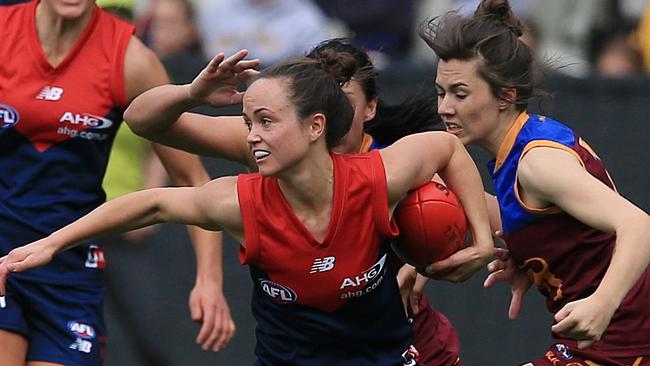
HM: You’ve said to me you were a tomboy?
DP: Yes, absolutely. I played football and dressed myself in boys clothes and hated tying my hair up, people would often confuse me for a boy. I remember being a bit reluctant to tell people my name because a name like Daisy usually gave it away! I didn’t want to be a boy, but I was more comfortable with them getting it wrong than the awkward moment of “Daisy? Isn’t that a girl’s name?” and the follow-up questions that came with it. I preferred my own internal embarrassment over any awkward confrontation — still do!
HM: You were aware of your insecurities as an 11-year-old?
DP: Yes, I was. As a kid I was a tomboy, and pretty set in my ways about how I wanted to dress. I didn’t want to tie my hair up, I always wore boys clothes. I was always aware that I was a bit different. As I got older, into my teens, I started wanting to express myself differently and be more ‘girlie’ but every time I did wear a dress or tie up my hair everyone would comment. People had good intentions and were always very complimentary but it just created attention, attention that I didn’t want, so I consciously phased the girlie clothes in and sometimes just stuck with what people were used to in order to avoid any attention. It’s scary to think your 11-year-old brain would be thinking about all that.
HM: And now you’re completely happy in your own skin?
DP: Yes, for the most part. Naturally, we all still have insecurities and moments of self-doubt. Over time I’ve slowly learnt how to cope with them, and move on.
HM: When your parents separated you had the choice of going with your mother or staying with your father. You are the only one who stayed with your father, why was that?
DP: Yes, we were given the choice of moving to Melbourne with Mum or staying with Dad. The car was packed for the move and up that point I had told Mum I was going with her, but also told Dad I was staying with him. Being the middle child, I think I was trying to please everyone. I ended up choosing to stay in Bright with Dad. Partly because I was a bit insecure about starting at a new school, partly because I wanted to keep playing footy but in hindsight I think I made that decision because I thought someone better stay and look after dad.
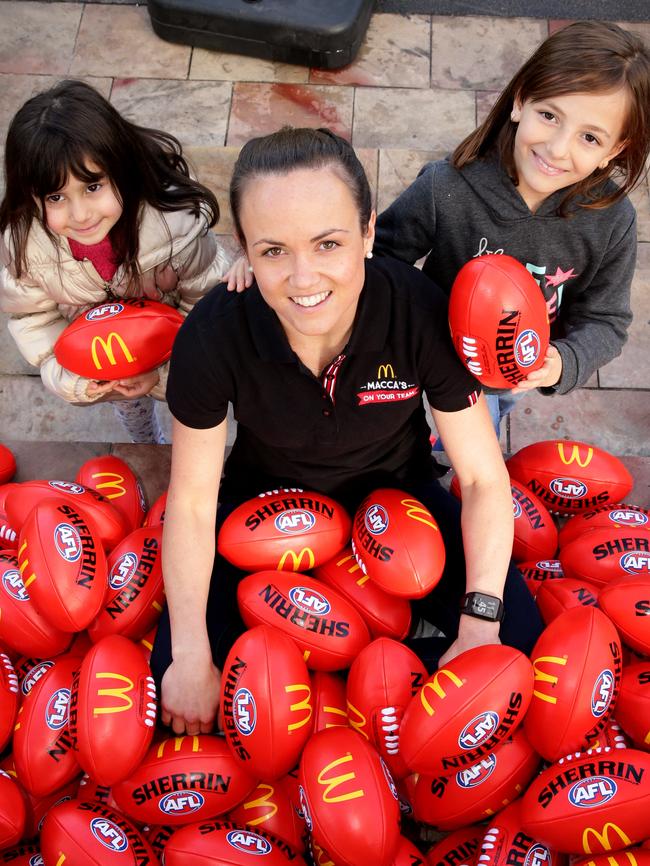
HM: No decision til the cars were packed — that’s a late call! Your father had a number of jobs along the way.
DP: He was a pilot, a truck driver, a lab technician, and the after-school care co-ordinator at school. He left school when he was in year nine. He worked at Telstra as a linesman, he was also a postie, and a bus driver.
HM: More jobs than Frank Abagnale Jr ...
DP:(laughs) And he probably got the jobs in the same manner!
HM: Is it true that at one stage in your very early childhood, you and your father were the only people in a 56-seater bus, and he wasn’t the one driving it?
DP: I’ll just say true.
HM: On an open highway?
DP: Yes. He made sure I did the speed limit and I had been driving a car around in the paddock for a few years.
HM: That’s OK then!?! You were very competitive with your older brother Harry. Do you think that is in part the reason why you are such a competitive sportsperson?
DP: We just always wanted to better each other at anything we did, so everything we did was high-stakes and highly competitive. You’re a product of your environment, aren’t you? He would sledge me fairly badly as well, and there was some awful stuff that he would say in the process. It made me pretty resilient to what you hear out on the footy field.
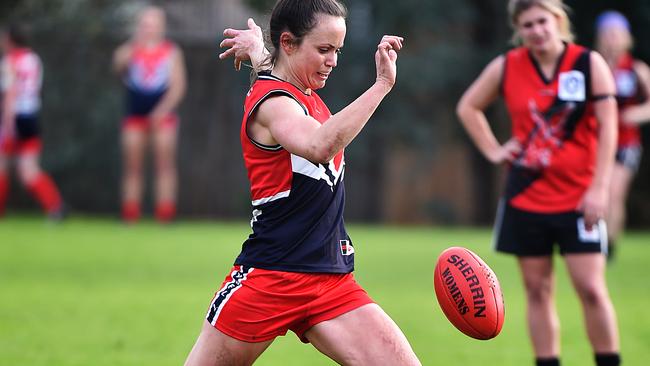
HM: When did you become an influence on the field?
DP: I was far from a child prodigy. But I guess I started to have an impact on games when I was 13 or 14. I won the league goal kicking when I was 14.
HM: Ben Reid of Collingwood fame was in that side; where did he play?
DP: Centre half-forward and was a gun. Sam Reid played as well, but he was younger so I never played in the same side as him.
HM: You played in the EJ Whitten Legends game a few years ago. Is that the biggest game you’ve played in?
DP: At the time it was. It was one of the first times female football was represented on a big stage. The game was televised, and it being a bit of an icon of the football landscape, I felt responsible for representing women and women’s football well.
HM: You are a leading voice in women’s footy — do you feel that weight of responsibility?
DP: Definitely. I feel like I have a responsibility to showcase the game and represent it well. For whatever reason I have been made to be one of the more visible or recognised players of the game. That brings with it the expectation that I’m supposed to be the best player. Out on the field it is far from a case of Daisy Pearce and then the rest, there are some amazing players out there. I am just one of many. I have never run around thinking that I’m the best. I’m constantly watching teammates and opponents that I admire and trying to adapt some of their strengths into my game. I am well aware that I can get better and need to get better to keep up with them all.
HM: Most people know you as a footballer, but you’re also a midwife. Have you put midwifery on hold for now?
DP: I have put it on hold but I miss it. I worked as a midwife for close to five years before I left in December last year. It was a job that I just absolutely cherished, and I think that it’s the most amazing job in the world. Every day you are there in the most special moment of people’s lives, and you have a responsibility to make sure that they walk away having had a good experience. You’ve got the power to make a difference every day that you go to work. It’s almost addictive how rewarding that is, and how intense that responsibility is.
HM: How many babies have you delivered?
DP: I was nearing 150 when I left in December.
HM: Have you had any terrible moments among that?
DP: Yes. When I say responsibility, you have a big responsibility. It wasn’t until I stepped away that I realised how much emotional energy I was using thinking: “I hope I made the right decision”, “I hope that ended well” or “I hope she is okay”. You spend a lot of time thinking about that when you’re away from work, even after your shift has finished. It hurts when things don’t go right.
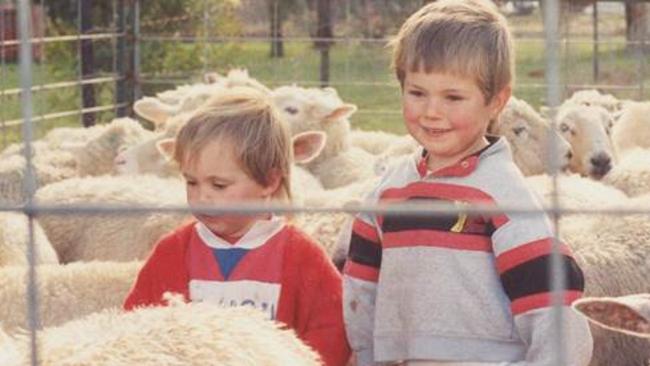
HM: How do you compartmentalise when things don’t go right?
DP: It’s very hard. Having very supportive colleagues helps. I think you just have to remind yourself that pregnancy and childbirth is so unpredictable. As midwives we want the best for everyone and human nature dictates that we want control over everything, but essentially we are animals and it’s not a perfect science.
HM: I walked into the theatre with my wife not knowing anyone in the room, apart from the obstetrician. Suddenly they are the most important people in your world.
DP: That is both the challenge and the privilege of the job. People hand over their trust to you within five minutes. Working within the public system as a midwife, I would clock on at 7 o’clock, introduce myself to someone, and six hours later, if you have done your job well, they trust you to guide them through the hardest and most special thing they might ever do in their life.
HM: Delivering a footy or delivering a baby — which are you better at?
DP: I would say delivering a baby. There really is no comparison to the feeling you get when you see a new baby take its first breath after a tough labour, and hand it to its exhausted but adoring parents. Besides, my kicking efficiency has been a bit average of late.
HM: Speaking of mothers, your mum, Dee seems a magnificent woman. How did you cope when she was diagnosed with breast cancer?
DP: When she told me, she did it in typical Mum fashion, to try and brush it off and not get me worried. Knowing she was protective of us I often worried that she wouldn’t be telling me the full story. We just tried to keep moving forward as a family. You have to adjust because the person everyone leans on is vulnerable. Of course at times I found myself contemplating the worst case scenario. It was scary but I knew I would be OK; mum had brought me up to be quite independent and resilient.
HM: You’re 28 now, your mum was diagnosed when you were ...
DP: 22.
HM: And your parents separated when you were?
DP: Seven.
HM: What do you think you develop as a person through the experiences of your parents separating, your mother having breast cancer and being slightly different to everyone else growing up?
DP: You develop a hardness that helps you survive when it feels like your world is falling down around you. I’ve always been a very proud sort of person, too proud to let myself fall victim to circumstance without putting up a fight. When your parents break up they communicate through you at times, rather than each other, which exposes you to adult conversations at a young age. It makes you grow up quicker than others. I think that is why I love kids now and will take any opportunity to muck around and carry on like a big kid myself.
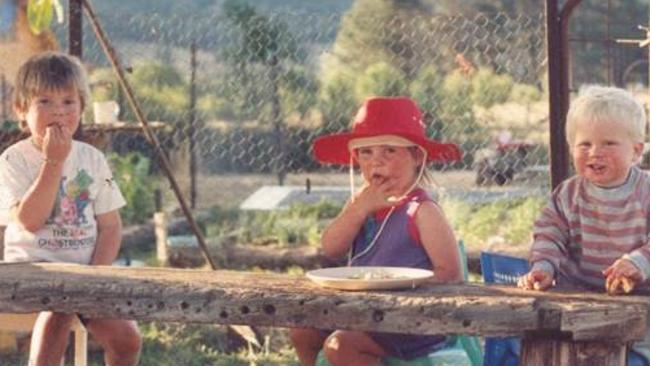
HM: Your mother is now healthy and happy?
DP: Yes, she is. Who knows, breast cancer might still get the better of her, but as far as we know she is through it. She and Joel and my youngest brother and sister have just made the seachange to the NSW coast. Mum is as happy as she’s ever been. I love seeing her relaxed.
HM: Townsville to Broome is a long drive, who did you do it with?
DP: My boyfriend at the time, and two family friends of his.
HM: You passed through quite a few indigenous communities. What did you learn from that?
DP: You feel a bit insignificant actually. A lot of the places we went to were so remote, and removed from the worries of day-to-day life as we see it. You learn a bit about indigenous history and culture, which is something I’m intrigued by. You learn a lot about yourself, just having that space.
HM: How long did it take to drive?
DP: About four months — we were in no hurry. At the end of year 12 I decided I was already a year ahead, so why not take a gap year. I worked at a pub on Magnetic Island for three months, which was great. Our shifts would start at 5 o’clock at night at the sports bar, so I was on the beach until 4.55pm. Once we saved up a bit of money there, we drove with one friend up to Arnhem Land. We then joined up with two other boys and drove right up to Mitchell River, and then up to the tip of Western Australia. Most days I would look around and wonder if anyone had ever stood here.
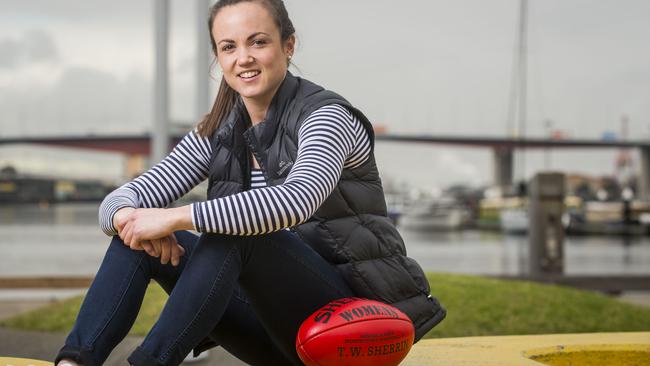
HM: Your partner, Angus, works near Bendigo. How often do you see each other?
DP: We bought a house down here in Melbourne, but because he works on a farm, I’ve got the run of our place. Farming can be a bit of a 24-7 thing, so I don’t see him as often as I’d like to but we make it work. When we first met he was working in Melbourne, at an engineering and construction company.
HM: So do you end up on the farm with Angus?
DP: Eventually yes. Our long-term vision was that I would be a midwife in Bendigo, and we’d live on the farm. Having grown up in Bright, the country lifestyle appeals to me. I wasn’t far away from doing that, but when I made a career change over to the Melbourne Football Club and a few opportunities in the media popped up, I had to take them. It was a bit of a now or never thing.
HM: What do you think the rush will be like in February next year, round one in the first game of the Women’s National Football League?
DP: I will be pinching myself. It’s going to be so different from footy as we know it now. The standard will be higher, the stakes are higher, the scrutiny will be more intense. The exhibition matches have been amazing but next year we’re playing for points and ultimately a place in the grand final, so there is a lot more at stake. There will be an incredible amount of nervous excitement, but bring it on.
HM: Did you always know the Women’s National Football League was going to happen?
DP: I thought it would happen, but I didn’t think it would be in my playing career.
HM: What is the perfect job for you in 10 years’ time?
DP: I really want a family so the 10-year vision is to be a mum who doubles as their sports coach — but not in the Damir Dokic mould — as well as doing a few shifts as a midwife and calling football next to you on the weekend.
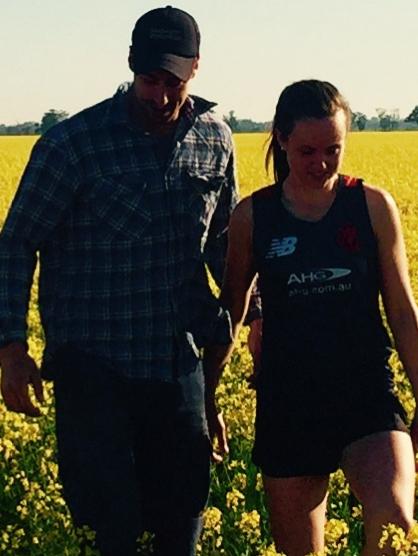
HM: Who has helped you the most in football to get you to where you are now?
DP: Dad played an important role in the beginning. There were many times where I was told I shouldn’t play the game, purely because I was a girl. Dad was always encouraging and helped me ignite that motivation to dig in and stick with it. Peta Searle, my first coach at Darebin. She was massive for my development, whether you had a really good game or a poor one, the message was always about what we could do to get better. I think it has been one of the reasons our club has been so successful, and it has helped set my career on the path that it has taken. From a playing perspective, Michelle Cowan has been enormous as well. She has taught me the power of leadership, and what you can do on the football field with that.
HM: Until now what has been the most difficult part about being a female playing football?
DP: Motivating yourself to strive for something that doesn’t exist.
HM: You trained in the hope of something that might not be. It’s very different to the Olympic dream where there is a set goal.
DP: You just have to find a way to keep resetting that bar for yourself. A big part of why we are here — on the verge of a national competition — is that I wasn’t the only person that thought like that. We are here because there has been a critical mass of female players, administrators and volunteers who have just kept banging on the door of footy clubs and the AFL and pushing for more opportunities
HM: We hope that the environment we live in is less racist. Do you think it is less sexist?
DP: Definitely. We’ve heard people label the AFL and football clubs as a “boy’s club”, and hearing stories of days gone it certainly sounds like it might have been. But right now I feel respected and valued in the industry. Some of my most important mentors and supporters are men. I reflect on my experience in the AFL very positively but I suppose even, say, five years ago, I would get invited to a breakfast or talk on radio about the Women’s Football League and it almost felt like a token gesture. It was almost like they were ticking a box just to say they had talked about it; there wasn’t a genuine interest or acknowledgment. There has been an enormous shift. It’s not just a matter of social responsibility anymore — it feels more genuine.
HM: Do people recognise you on the street more now than, say, two years ago?
DP: Yeah, they do. The days of going to the supermarket in bare feet are over!
HM: Are you enjoying the media?
DP: Yes, I enjoy it. It’s challenging and I have fleeting moments of thinking I’m not cut out for it, but you won’t hear me complaining about watching and analysing football as a job. I still get a bit nervous, plus the hair and make-up thing has been an eye-opener, but I look forward to the day that I can be as relaxed as you are!
HM: Did you ever think you would be hosting a Friday night football program alongside Cameron Ling?
DP: I had the dream, but I didn’t realistically think it would happen. Funnily though, when I was young, Dad and I would sit and watch the football on TV with his pilot headsets on, volume turned down and commentate the entire match — taking ourselves very seriously, I might add. There must have been some part of me that thought I would!
HM: Great boyfriend, new women’s league, media has opened up. Life is good for you, well done.
DP: It’s bloody good, Hame, bloody good.


